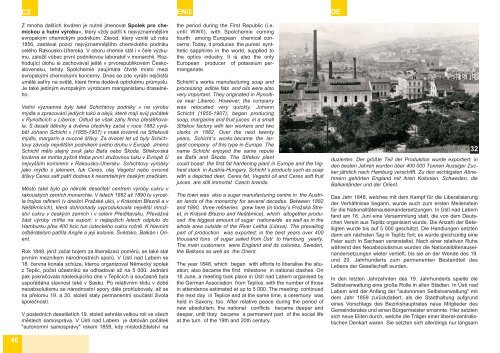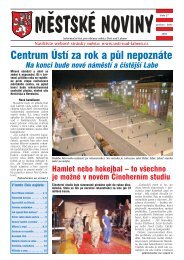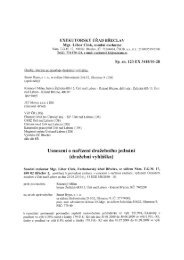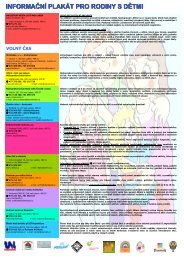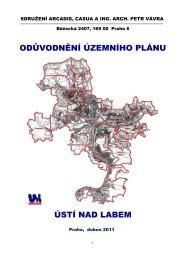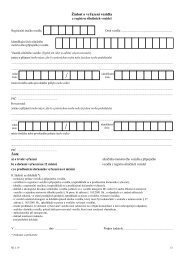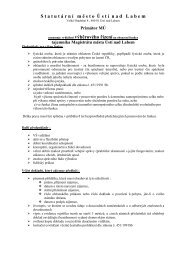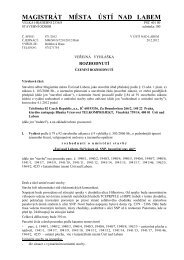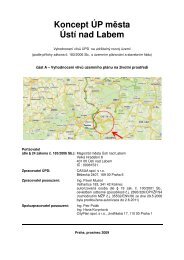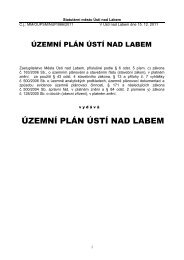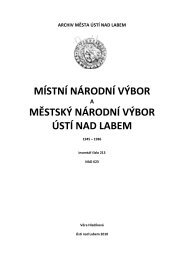Historie a památky města Ústí nad Labem History and monuments of ...
Historie a památky města Ústí nad Labem History and monuments of ...
Historie a památky města Ústí nad Labem History and monuments of ...
Sie wollen auch ein ePaper? Erhöhen Sie die Reichweite Ihrer Titel.
YUMPU macht aus Druck-PDFs automatisch weboptimierte ePaper, die Google liebt.
40<br />
CZ ENG DE<br />
Z mnoha dalších továren je nutné jmenovat Spolek pro chemickou<br />
a hutní výrobu», který vždy patřil k nejvýznamnějším<br />
evropským chemickým podnikům. Závod, který vznikl už roku<br />
1856, zastával pozici nejvýznamnějšího chemického podniku<br />
celého Rakousko-Uherska. V oboru chemie stál i v čele výzkumu,<br />
založil vůbec první podnikovou laboratoř v monarchii. Rozhodující<br />
úlohu si zachovával ještě v prvorepublikovém Československu,<br />
tehdy Spolchemie zaujímala čtvrté místo mezi<br />
evropskými chemickými koncerny. Dnes se zde vyrábí nejčistší<br />
umělé safíry na světě, které firma dodává optickému průmyslu.<br />
Je také jediným evropským výrobcem manganistanu draselného.<br />
Velmi významné byly také Schichtovy podniky » na výrobu<br />
mýdla a zpracování jedlých tuků a olejů, které mají svůj počátek<br />
v Rynolticích u Liberce. Odtud se však záhy firma přestěhovala.<br />
S deseti dělníky a dvěma úředníky začal v roce 1882 vyrábět<br />
Johann Schicht » (1855-1907) v malé továrně na Střekově<br />
mýdlo, margarín a ovocné šťávy. Za dvacet let už byly Schichtovy<br />
závody největším podnikem svého druhu v Evropě. Jméno<br />
Schicht mělo stejný zvuk jako Baťa nebo Škoda. Střekovská<br />
továrna se mohla pyšnit třeba první ztužovnou tuku v Evropě či<br />
nejvyšším komínem v Rakousko-Uhersku. Schichtovy výrobky<br />
jako mýdlo s jelenem, tuk Ceres, olej Vegetol nebo ovocné<br />
šťávy Ceres saft patří dodnes k nesmrtelným českým značkám.<br />
Město také bylo po několik desetiletí centrem výroby cukru v<br />
rakouských zemích monarchie. V letech 1882 až 1890 tu vyrostla<br />
trojice rafinerií (v dnešní Pražské ulici, v Krásném Březně a v<br />
Neštěmicích), která dohromady vyprodukovala největší množství<br />
cukru v českých zemích i v celém Předlitavsku. Převážná<br />
část výroby mířila na export; v nejlepších letech odplulo do<br />
Hamburku přes 400 tisíc tun ústeckého cukru ročně. K hlavním<br />
odběratelům patřila Anglie a její kolonie, Švédsko, Balkán i Orient.<br />
Rok 1848, jenž začal bojem za liberalizaci poměrů, se také stal<br />
prvním mezníkem národnostních sporů. V <strong>Ústí</strong> <strong>nad</strong> <strong>Labem</strong> se<br />
18. června konala schůze, kterou organizoval Německý spolek<br />
z Teplic, počet účastníků se odhadoval až na 5 000. Jednání<br />
pak pokračovala následujícího dne v Teplicích a současně byla<br />
uspořádána slavnost také v Sasku. Po relativním klidu v době<br />
neoabsolutismu se národnostní spory dále prohlubovaly, až se<br />
na přelomu 19. a 20. století staly permanentní součástí života<br />
společnosti.<br />
V posledních desetiletích 19. století sehrála velkou roli ve všech<br />
městech samospráva. V <strong>Ústí</strong> <strong>nad</strong> <strong>Labem</strong> je datován počátek<br />
"autonomní samosprávy" rokem 1859, kdy místodržitelství na<br />
the period during the First Republic (i.e.<br />
until WWII), with Spolchemie coming<br />
fourth among European chemical concerns.<br />
Today, it produces the purest synthetic<br />
sapphires in the world, supplied to<br />
the optics industry. It is also the only<br />
European producer <strong>of</strong> potassium permanganate.<br />
Schicht´s works manufacturing soap <strong>and</strong><br />
processing edible fats <strong>and</strong> oils were also<br />
very important. They originated in Rynoltice<br />
near Liberec. However, the company<br />
was relocated very quickly. Johann<br />
Schicht (1855-1907), began producing<br />
soap, margarine <strong>and</strong> fruit juices in a small<br />
Střekov factory with ten workers <strong>and</strong> two<br />
clerks in 1882. Over the next twenty<br />
years, Schicht´s works became the largest<br />
company <strong>of</strong> this type in Europe. The<br />
name Schicht enjoyed the same repute<br />
as Baťa <strong>and</strong> Škoda. The Střekov plant<br />
could boast the first fat hardening plant in Europe <strong>and</strong> the highest<br />
stack in Austria-Hungary. Schicht´s products such as soap<br />
with a depicted deer, Ceres fat, Vegetol oil <strong>and</strong> Ceres s<strong>of</strong>t fruit<br />
juices are still immortal Czech br<strong>and</strong>s.<br />
The town was also a sugar manufacturing centre in the Austrian<br />
l<strong>and</strong>s <strong>of</strong> the monarchy for several decades. Between 1882<br />
<strong>and</strong> 1890, three refineries grew here (in today’s Pražská Street,<br />
in Krásné Březno <strong>and</strong> Neštěmice), which altogether produced<br />
the biggest amount <strong>of</strong> sugar nationwide as well as in the<br />
whole area outside <strong>of</strong> the River Leitha (Litava). The prevailing<br />
part <strong>of</strong> production was exported; in the best years over 400<br />
thous<strong>and</strong> tons <strong>of</strong> sugar sailed from <strong>Ústí</strong> to Hamburg yearly.<br />
The main customers were Engl<strong>and</strong> <strong>and</strong> its colonies, Sweden,<br />
the Balkans as well as the Orient.<br />
The year 1848, which began with efforts to liberalise the situation,<br />
also became the first milestone in national clashes. On<br />
18 June, a meeting took place in <strong>Ústí</strong> <strong>nad</strong> <strong>Labem</strong> organised by<br />
the German Association from Teplice, with the number <strong>of</strong> those<br />
in attendance estimated at up to 5 000. The meeting continued<br />
the next day in Teplice <strong>and</strong> at the same time, a ceremony was<br />
held in Saxony, too. After relative peace during the period <strong>of</strong><br />
new absolutism, the national conflicts became deeper <strong>and</strong><br />
deeper, until they became a permanent part <strong>of</strong> the social life<br />
at the turn <strong>of</strong> the 19th <strong>and</strong> 20th century.<br />
32<br />
duzierten. Der größte Teil der Produktion wurde exportiert; in<br />
den besten Jahren wurden über 400 000 Tonnen Aussiger Zucker<br />
jährlich nach Hamburg verschifft. Zu den wichtigsten Abnehmern<br />
gehörten Engl<strong>and</strong> mit ihren Kolonien, Schweden, die<br />
Balkanländer und der Orient.<br />
Das Jahr 1848, welches mit dem Kampf für die Liberalisierung<br />
der Verhältnisse begann, wurde auch zum ersten Meilenstein<br />
für die Nationalitätenausein<strong>and</strong>ersetzungen. In <strong>Ústí</strong> <strong>nad</strong> <strong>Labem</strong><br />
f<strong>and</strong> am 18. Juni eine Versammlung statt, die von dem Deutschen<br />
Verein aus Teplitz organisiert wurde. Die Anzahl der Beteiligten<br />
wurde bis auf 5 000 geschätzt. Die H<strong>and</strong>lungen setzten<br />
dann am nächsten Tag in Teplitz fort; es wurde gleichzeitig eine<br />
Feier auch in Sachsen veranstaltet. Nach einer relativen Ruhe<br />
während des Neoabsolutismus wurden die Nationalitätenausein<strong>and</strong>ersetzungen<br />
wieter vertieft, bis sie an der Wende des 19.<br />
und 20. Jahrhunderts zum permanenten Best<strong>and</strong>teil des<br />
Lebens der Gesellschaft wurden.<br />
In den letzten Jahrzehnten des 19. Jahrhunderts spielte die<br />
Selbstverwaltung eine große Rolle in allen Städten. In <strong>Ústí</strong> <strong>nad</strong><br />
<strong>Labem</strong> wird der Anfang der "autonomen Selbstverwaltung" mit<br />
dem Jahr 1859 zurückdatiert, als die Stadthaltung aufgrund<br />
eines Vorschlags des Bezirkshauptrates neue Mitglieder des<br />
Gemeinderates und einen Bürgermeister ernannte. Hier setzten<br />
sich neue Eliten durch, welche die Träger einer liberal-zentralistischen<br />
Denkart waren. Sie setzten sich allerdings nur langsam


